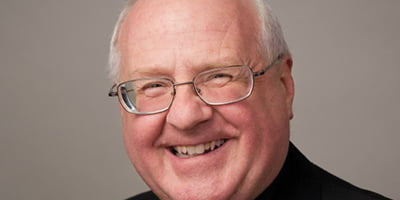
Father Mark Goldasich is the pastor of Sacred Heart parish in Tonganoxie. he has been editor of the Leaven since 1989.
by Father Mark Goldasich
Did you hear about the minister who did a demonstration sermon one weekend to get the attention of his congregation?
At the beginning of the service, he set up a table with four jars and a small dish of worms on it. Dramatically, the pastor raised each container.
The first jar contained alcohol. Plop! He dropped a worm into it.
The second jar was covered and contained cigarette smoke. He unscrewed the lid and plopped a worm into the jar.
The third jar, containing chocolate syrup, also received a worm.
The fourth jar was filled with dirt, and the pastor placed the final worm into it.
He prayed silently for a few minutes and then returned to the jars.
“Observe what has happened!” he thundered.
He lifted the first jar, and the worm in the alcohol was dead. The worm in the second jar of cigarette smoke was also dead. The chocolate syrup in the third jar killed the worm in it. Lastly, with great enthusiasm, the pastor lifted high the fourth jar containing the dirt.
The worm inside was contentedly burrowing deeper.
“Now, what’s the point?” asked the pastor, pleased with his demonstration.
From the very last pew, Maxine raised her hand and said, “I suppose the point is: If you drink, smoke and eat chocolate, you won’t have worms!”
Yup, that pretty much ended the service!
Obviously, the pastor in the story wanted the congregation to be immersed in the good soil of the Gospel and their faith so they could grow and thrive. Alcohol, smoking and gluttony would kill them. He thought the point was crystal clear. It wasn’t.
Jesus, too, experienced the same thing. How many times in the Gospels did the apostles or others not grasp the point that he was making? And, yes, we’re the same way.
Next weekend, Oct. 22-23, we mark World Mission Sunday. Like many of the special collections in the church throughout the year, we might see this as just another plea for more funds. It might even take us back to the days of our childhood when we were encouraged to clean our plates because “there are starving children in China who would love to eat that.” (No doubt a lot of kids who heard this or something similar would have been more than happy to supply both the envelope and the postage necessary to mail off the Brussels sprouts, broccoli or spinach that sat staring at them on their plates.)
World Mission Sunday, it seems, strives to remind us of what it means to be “church.” Essentially, the church is not a physical building; it’s people — “living stones,” as the First Letter of Peter reminds us (2:5). This special Sunday widens our perspective by putting a human face on the church around the world. And that “face” is of Jesus suffering, from being orphaned, ill, hungry, or homeless.
It’s awfully hard not to be generous when the poor have a face and a name. For me, that would be John, a soon-tobe six-year-old boy in the Philippines that I sponsor. John’s father is a laborer and his mother is a cook. The family lives in a house of concrete blocks and flooring, with a palm-leaf roof. It has one multipurpose room; John sleeps on a mattress on the floor. The family uses a community toilet and gets water from a community pump. Because John’s district consists of small islands, it’s tough to get the essentials of life: clothing, shoes, education and medicine.
Even though John lives thousands of miles away, Jesus reminds me that he’s still my “neighbor.” And I am called to love that neighbor as myself. Here I am, often too-well fed, living in a multi-room duplex by myself, with clean water and indoor plumbing. I lack neither clothes nor shoes and sleep comfortably on a bed. I was blessed to have an excellent education and have ready access to medical and dental care. If I love these things for myself, the Gospel tells me that I must love them for John and all those like him.
What deep wisdom missionaries in foreign lands show when they care for both the souls and the bodies of those they serve. They don’t wait for the people to come to them; instead, they go to where the people are, sharing their everyday lives. Missionaries understand well the English proverb that says: “Hungry bellies have no ears.” Bringing the basic necessities to the poor of this world is preaching the Gospel: It is the love of Christ made visible.
To prepare for World Mission Sunday next week, read about the appeal on pages 8 and 9 of this issue. Then, sacrifice one small “treat” each day and set aside that money for this special collection.
Finally, consider what you would do if a relative or friend approached you for help when in desperate need. We’re called to treat the poor of this world in exactly the same way — after all, they really are our brothers and sisters.
And that’s the whole point.


